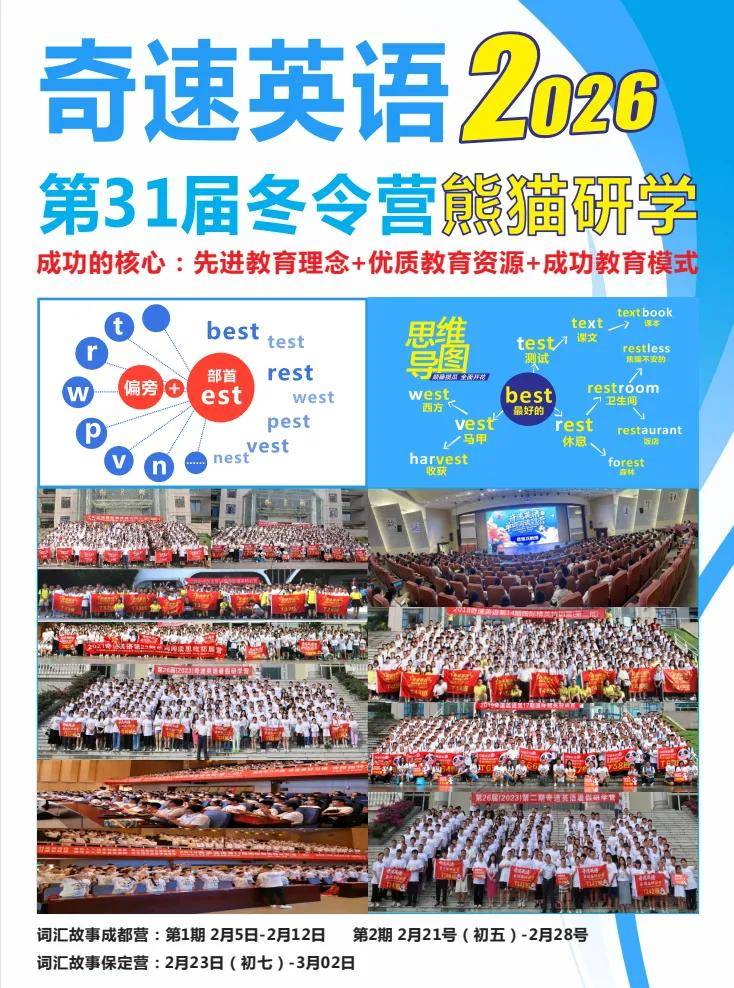【初中英语】50组中考英语重难点词语辨析(新篇)
在英语学习中,许多词汇看似含义相近,但在具体语境、搭配用法和语义侧重上存在显著差异。掌握这些易混淆词汇的区别,是提升英语表达准确性的关键。以下整理了 50 组高频易混淆词汇,结合具体例句解析其核心差异,帮助学习者精准运用。
1. also, too, either
三者均表示 “也”,但使用场景和句式不同:
- also
- :多用于肯定句,位置较灵活,可放在 be 动词、情态动词之后,实义动词之前。例:She also likes playing the piano.(她也喜欢弹钢琴。)
- too
- :仅用于肯定句,通常放在句末,前面可加逗号。例:He finished his homework on time, too.(他也按时完成了作业。)
- either
- :用于否定句,放在句末,前面加逗号。例:I don’t like spicy food, either.(我也不喜欢吃辣。)
2. big, large, great
三者均表 “大”,但描述对象和语义侧重不同:
- big
- :日常用词,侧重 “体积、规模较大”,可用于具体事物或抽象概念(如年龄、程度)。例:There’s a big tree in our yard.(我们院子里有一棵大树。)/ He’s a big fan of basketball.(他是个篮球迷。)
- large
- :较正式,侧重 “面积、数量、范围大”,多修饰具体事物,不用于形容人或抽象的 “重要性”。例:This city has a large population.(这座城市人口众多。)
- great
- :侧重 “程度深、重要性高”,可形容抽象事物(如成就、影响)或表 “精彩的”。例:She made a great contribution to science.(她为科学做出了巨大贡献。)/ It was a great movie.(那是一部精彩的电影。)
3. because, since, as, for
四者均表 “原因”,但语气强度和用法不同:
- because
- :语气最强,直接回答 “why”,引导的从句是句子核心,可置于句首或句末。例:I stayed home because I was tired.(我因为累了所以待在家里。)
- since
- :语气较弱,表 “已知的、显而易见的原因”,常译为 “既然、因为”,从句多置于句首。例:Since it’s raining, we can’t go out.(既然下雨了,我们就不出去了。)
- as
- :语气比 since 更弱,表 “伴随的原因”,常译为 “由于”,从句多置于句首,且句子结构较紧凑。例:As she was late, she missed the first class.(由于她迟到了,没赶上第一节课。)
- for
- :并列连词,不表直接原因,仅补充说明 “推断性原因”,引导的从句需置于句末,且前面加逗号。例:He must be ill, for he didn’t come to work.(他一定病了,因为他没来上班。)
4. borrow, lend, keep
三者均与 “借” 相关,但动作方向和时间维度不同:
- borrow
- :“借入”,以主语为中心,指从他人处借走某物,搭配 “borrow sth. from sb.”,强调 “瞬间动作”。例:Can I borrow your umbrella from you?(我能借你的伞用一下吗?)
- lend
- :“借出”,以主语为中心,指把某物借给他人,搭配 “lend sth. to sb.” 或 “lend sb. sth.”,同样强调 “瞬间动作”。例:She refused to lend her bike to me.(她不肯把自行车借给我。)
- keep
- :“保留、借用(一段时间)”,强调 “持续的状态”,常与表示时间段的短语连用(如 for a week)。例:You can keep this book for two weeks.(这本书你可以借两周。
5. buy, purchase
二者均表 “购买”,但语体和使用场景不同:
- buy
- :日常口语用词,使用范围极广,可用于购买任何物品,搭配灵活(buy sth. for sb. /buy sb. sth.)。例:I went to the supermarket to buy some milk.(我去超市买了些牛奶。)
- purchase
- :正式书面用词,多用于商业、交易或大额购买场景,可作动词或名词。例:The company purchased a new office building last year.(公司去年购置了一栋新办公楼。)/ The purchase of the equipment cost a lot.(购置这台设备花了不少钱。)
6. call, ring, phone
三者均表 “打电话”,但语体和搭配略有差异:
- call
- :最通用,可用于口语和书面语,搭配 “call sb.” 或 “call sb. up”(口语中 up 可省略)。例:I’ll call you as soon as I arrive.(我一到就给你打电话。)
- ring
- :英式口语常用,侧重 “铃声响起” 的动作,搭配 “ring sb.” 或 “ring sb. up”。例:He rang me twice yesterday, but I was busy.(他昨天给我打了两次电话,但我当时很忙。)
- phone
- :可作动词或名词,动词用法与 call 相近(phone sb.),名词指 “电话”(=telephone)。例:She phoned her parents every weekend.(她每周都给父母打电话。)/ Can I use your phone?(我能用一下你的电话吗?)

7. can, could, be able to
三者均表 “能、会”,但语气、时态和用法不同:
- can
- :情态动词,无人称和数的变化,仅用于现在时和过去时(过去时为 could),侧重 “能力或许可”。例:He can speak three languages.(他会说三种语言。)/ You can go home now.(你现在可以回家了。)
- could
- :can 的过去式,表 “过去的能力”;也可用于现在时,表 “委婉的请求或可能性”,语气比 can 弱。例:When I was young, I could swim very fast.(我小时候游泳能游得很快。)/ Could you pass me the salt?(你能把盐递给我吗?)
- be able to
- :可用于各种时态(am/is/are able to; was/were able to; will be able to 等),侧重 “通过努力实现的能力”,可与 can 互换,但在完成时和将来时中只能用 be able to。例:After practicing for a month, she was able to play the song well.(练习了一个月后,她终于能把这首曲子弹好了。)/ We will be able to finish the project next month.(我们下个月就能完成这个项目。)
8. carry, hold, take
三者均与 “拿、带” 相关,但动作含义不同:
- carry
- :“搬运、携带”,侧重 “用手或工具托着、扛着”,且通常有 “移动一段距离” 的含义,不强调 “持续握住”。例:She carried a heavy bag to the office.(她扛着一个沉重的包去了办公室。)
- hold
- :“握住、拿着”,侧重 “用手或身体支撑某物,保持静止状态”,不强调 “移动”。例:He held a cup of coffee in his hand.(他手里拿着一杯咖啡。)
- take
- :“拿走、带走”,侧重 “从说话人所在位置带到别处”,与 bring(带来)方向相反。例:Don’t forget to take your umbrella when you go out.(出门时别忘了带伞。)
9. close, shut
二者均表 “关闭”,但语体和使用场景略有差异:
- close
- :通用词,可用于任何可 “关闭” 的事物(如门、窗、眼睛、商店等),可作动词或形容词(表 “近的”)。例:Please close the window before you leave.(离开前请关上窗户。)/ The bank is close to my home.(银行离我家很近。)
- shut
- :语气比 close 稍强,更侧重 “完全关闭、密封”,可用于门、窗、嘴等,口语和书面语均可使用,但 “关闭商店、工厂” 时更常用 close(如 The shop closes at 9 pm)。例:He shut the door loudly and left.(他重重地关上门离开了。)/ She shut her eyes and took a deep breath.(她闭上眼睛深吸了一口气。)
10. common, ordinary, usual
三者均表 “普通的”,但语义侧重不同:
- common
- :侧重 “常见的、普遍的”,指某物或现象在多数情况下存在或发生。例:Colds are common in winter.(感冒在冬天很常见。)/ It’s a common mistake for beginners.(这是初学者常犯的错误。)
- ordinary
- :侧重 “平凡的、无特殊之处的”,指事物符合常规,没有特别的价值或特征。例:He lives an ordinary life in a small town.(他在一个小镇过着平凡的生活。)/ This is just an ordinary T-shirt, not expensive.(这只是一件普通的 T 恤,不贵。)
- usual
- :侧重 “习惯性的、通常的”,指符合某人或某物的常规习惯。例:She got up at her usual time this morning.(她今天早上像往常一样按时起床。)/ We had our usual breakfast—bread and milk.(我们吃了平时常吃的早餐 —— 面包和牛奶。)
11. die, dead, death
三者均与 “死亡” 相关,但词性和用法不同:
- die
- :动词(不及物),表 “死亡” 的瞬间动作,不能用于进行时,也不能与表示时间段的短语连用(需用 be dead)。例:His grandfather died in 2020.(他爷爷 2020 年去世了。)
- dead
- :形容词,表 “死亡的、去世的”,强调 “状态”,可用于 be 动词后,也可作定语,能与表示时间段的短语连用。例:His grandfather has been dead for three years.(他爷爷已经去世三年了。)/ There’s a dead tree in the park.(公园里有一棵枯树。)
- death
- :名词,表 “死亡” 的抽象概念或具体事件,可作主语、宾语等。例:The death of his pet dog made him very sad.(他宠物狗的去世让他很伤心。)/ She was frightened by the death in the accident.(她被事故中的死亡事件吓到了。)
12. do, make
二者均为实义动词,使用场景差异极大,需通过固定搭配区分:
动词
核心含义
常见搭配
do侧重 “完成动作、处理事务”,无明确 “制作” 含义
do homework(做作业)、do housework(做家务)、do business(做生意)、do sports(做运动)、do one’s best(尽力)
make侧重 “制作、创造、形成”,有明确 “从无到有” 的过程
make a cake(做蛋糕)、make a decision(做决定)、make friends(交朋友)、make money(赚钱)、make a mistake(犯错误)
例:She does her homework every evening, and sometimes she makes cards for her friends.(她每天晚上做作业,有时会给朋友做卡片。)

13. each, every
二者均表 “每个”,但指代范围和语法用法不同:
- each
- :指代 “两个或两个以上中的每一个”,可单独作主语、宾语或定语,也可与 of 连用(each of + 复数名词 / 代词),作主语时谓语动词用单数。例:Each student has a textbook.(每个学生都有一本课本。)/ I gave a gift to each of them.(我给了他们每个人一份礼物。)
- every
- :指代 “三个或三个以上中的每一个”,不能单独使用,只能作定语修饰单数名词,也可与 of 连用(every one of + 复数名词 / 代词),作主语时谓语动词用单数。例:Every child loves toys.(每个孩子都喜欢玩具。)/ Every one of the books is interesting.(每一本书都很有趣。)
14. easy, simple
二者均表 “容易的”,但语义侧重不同:
- easy
- :侧重 “做起来不费力、不需要复杂技能”,反义词是 difficult。例:This math problem is easy for me.(这道数学题对我来说很简单。)/ It’s easy to cook noodles.(煮面条很容易。)
- simple
- :侧重 “结构简单、不复杂”,反义词是 complex,可形容事物的设计、逻辑或人 “单纯的”。例:The machine has a simple structure.(这台机器结构简单。)/ He’s a simple man who likes quiet life.(他是个单纯的人,喜欢安静的生活。)
15. either, neither, both
三者均用于指代 “两者”,但语义和语法搭配不同:
- either
- :表 “两者中的任意一个”,可作主语、宾语或定语,作主语时谓语动词用单数,搭配 “either...or...”(要么…… 要么……)。例:You can take either book.(两本书你可以随便拿一本。)/ Either you or I am wrong.(要么你错了,要么我错了。)
- neither
- :表 “两者都不”,可作主语、宾语或定语,作主语时谓语动词用单数(口语中也可用复数),搭配 “neither...nor...”(既不…… 也不……),反义词是 both。例:Neither of the answers is correct.(两个答案都不对。)/ He likes neither coffee nor tea.(他既不喜欢咖啡也不喜欢茶。)
- both
- :表 “两者都”,可作主语、宾语或定语,作主语时谓语动词用复数,搭配 “both...and...”(两者都……)。例:Both of my parents are teachers.(我父母都是老师。)/ She can speak both English and French.(她既会说英语也会说法语。)
16. empty, vacant
二者均表 “空的”,但描述对象不同:
- empty
- :侧重 “里面没有内容或物品”,可形容盒子、瓶子、房间(无家具或人)等。例:The fridge is empty—we need to buy some food.(冰箱空了,我们得买点吃的。)/ The classroom was empty after school.(放学后教室空无一人。)
- vacant
- :侧重 “职位、房间、座位等未被占用的”,强调 “可使用的空缺状态”。例:There’s a vacant position in our company.(我们公司有一个空缺职位。)/ The vacant seat next to me was taken by an old man.(我旁边的空座位被一位老人占了。)
17. expensive, dear, costly
三者均表 “昂贵的”,但语体和使用场景不同:
- expensive
- :通用词,可用于形容任何价格高的物品,口语和书面语均可使用,反义词是 cheap。例:This watch is too expensive for me to buy.(这块手表太贵了,我买不起。)
- dear
- :英式英语常用,语气比 expensive 弱,可形容物品 “价格偏高”,也可用于口语中表 “亲爱的”(如 dear friend)。例:Fruits are dear in winter.(冬天水果价格偏高。)
- costly
- :正式用词,侧重 “因价格高而带来负担,或代价大的”,可形容物品、时间、错误等。例:The project turned out to be more costly than we expected.(这个项目最终比我们预期的更耗资。)/ It was a costly mistake.(那是一个代价高昂的错误。)
18. few, a few, little, a little
四者均表 “少量”,但修饰对象和语义肯定 / 否定不同:
词汇
修饰对象
语义
例句
few可数名词复数
否定(几乎没有)
He has few friends here.(他在这里几乎没有朋友。)
a few可数名词复数
肯定(有一些)
She bought a few apples.(她买了一些苹果。)
little不可数名词
否定(几乎没有)
There is little water in the bottle.(瓶子

